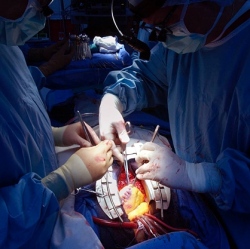
Prostate cancer could be ‘switched off’ after scientists discovered a way to prevent tumours from spreading. They found that a single molecule plays a crucial role in the forming of new blood vessels. Tumours need a constant supply of nutrient enriched blood to survive and grow. So stopping the production of blood vessels prevents cancer cells from multiplying and spreading.
When scientists injected mice three times a week with a drug to stop molecule SRPK1 from working, their tumour growth halted. "We reasoned that inhibition of SRPK1 activity could stop cancer progression,” said Dr Sebastian Oltean, the study’s co-author from the University of Bristol’s School of Physiology and Pharmacology.
“Indeed, we show in this paper that if we decrease SRPK1 levels in prostate cancer cells we are able to inhibit tumour vasculature and growth." Some 40,000 men are diagnosed with prostate cancer every year in the UK and 10,000 die from the disease. Because the treatment targets blood vessels, it is likely it could be used for other types of cancer and even for age-related macular degeneration, the most common form of blindness.
